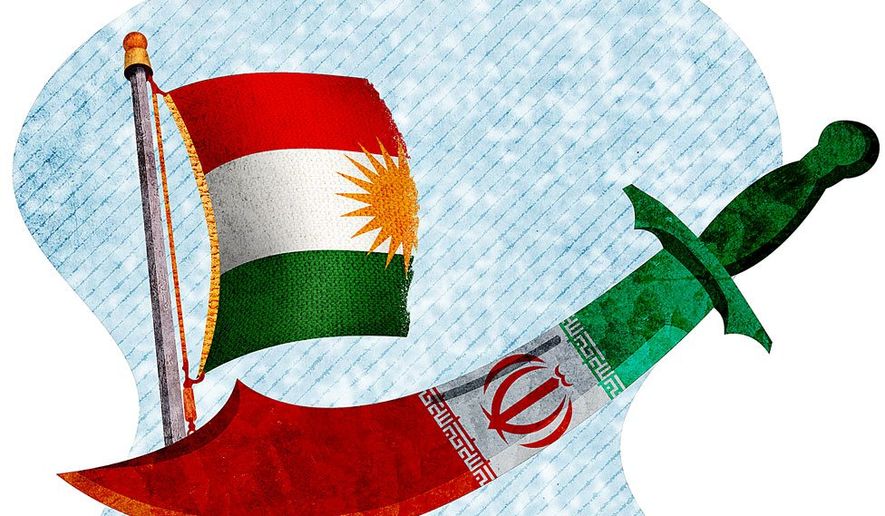OPINION:
On Oct. 16, Iranian-backed Shia militias, together with 9,000 Iraqi government forces, armed and trained by the U.S., invaded and took Kirkuk from the Iraqi Kurdish Peshmerga fighters.
It appears that the Iranians saw an opportunity to extend their influence in Iraq. Gen. Qassem Soleimani, commander of Iran’s Revolutionary Guard Corps (IRGC), instigated and supported the action to take Kirkuk. Using bribes and threats, Soleimani convinced fighters aligned with the Patriotic Union of Kurdistan (PUK), a non-governing Kurdish political party, to abandon Kirkuk, which the Kurds had captured from ISIS in 2014. This allowed Iran-backed Iraqi forces to take Kirkuk largely unopposed.
The seizure of Kirkuk is a key element of Iran’s plan for regional hegemony. A representative of the governing Kurdish Democratic Party said, “The Iraqi forces are actually Iranian forces realizing the control of the ’Shia Crescent’ from Iran through Iraq and Syria to Lebanon and the Golan Heights. In the end, they will get to Israel.”
On Sept. 25, President Masoud Barzani of the semi-autonomous Kurdistan regional government held a Kurdish secession referendum in which 93 percent voted for independence from Iraq. That vote, a strategic blunder, gave Iran and the Baghdad government the excuse to invade Kirkuk. Vigorously opposed by nearly every power in the region (except for Israel), the referendum alienated the Americans and has reversed years of Kurdish political and military gains.
Then, on Oct. 30, President Barzani, attempting to ease tensions with Baghdad, announced his resignation. But this didn’t stop the military advance of Iran-supported troops. It’s now apparent that Baghdad and the Iranians intend to isolate the Kurds, crippling them militarily and economically, to destroy hope for independence.
They captured oil fields, which provide 40-50 percent of all Kurdish revenues. The Iraqis have closed Kurdistan international airports and are cutting Iraqi-Kurd land links to Kurdish-controlled areas in Syria and Turkey.
Mr. Barzani’s Kurdish Peshmergas have been a critical U.S. ally in the battle against ISIS. They have proven more effective than the Iraqi army. The stateless, centuries-old Kurdish people, the fourth largest Middle Eastern ethnic group, are religiously tolerant and unabashedly pro-Western. They thought that America would support their dream of independence. What a tragic miscalculation.
With ISIS close to defeat, the U.S. remained neutral in the dispute between the Iraqis and the Kurds and ignored the Iranian-backed military action. Asked whether the United States had approved Baghdad’s actions in Kirkuk, State Department’s Heather Nauert said, “We have long called for a unified, democratic Iraq.”
President Trump just designated Soleimani’s Revolutionary Guard Corps as a terrorist organization, calling it “the Iranian Supreme Leader’s corrupt personal terror force and militia,” and promising to “work with our allies to counter the regime’s destabilizing activity and support for terrorist proxies in the region.”
That’s hardly what the U.S. just did in Kirkuk. We ignored Iran’s role and abandoned our most loyal and effective ally to preserve the fiction of a unified, democratic, pro-Western Iraq. Like Syria, Iraq is an artificial state of disparate groups, cobbled together by Western powers after WWI. American expectations for Iraq defy reality. And when President Obama pulled out of Iraq in 2011, he allowed Iran to fill the vacuum. Continuing our misguided policy guarantees that Iran’s Shiite puppets in Baghdad will keep control.
This current U.S. position plays right into Gen. Soleimani’s hands, giving tacit legitimacy to Iran’s actions.
If Iran and its proxy in Baghdad achieve their goal regarding the Iraqi Kurds, it will be both a major victory for Iran in extending its Shia Crescent and a profound defeat for America and the West.
The Iraqi Kurds’ future is at stake, together with the broader balance of power in the Middle East. Iraqi Kurdistan is a pro-American bulwark against both ISIS and Iran in a region rife with repressive Islamism. The U.S. should use Kurdistan as strategic leverage against Iran (something we lost with Mr. Obama’s Iran deal) and with Iraq (something we lost with Mr. Obama’s 2011 pullout).
Dick Cheney’s national security adviser John Hannah told Kurdistan TV, “The U.S. needs to understand that this is no longer a matter of Kurds and Arabs. This is now the Iranian Islamic Revolutionary Guard Corps against America; Qassem Soleimani against Donald Trump. Whatever the administration thought about the wisdom of the [Kurds’] peaceful referendum on independence, it would be a terrible blow to U.S. interests to allow an Iranian terrorist group and its Iraqi proxies to respond by smashing a critical American ally with impunity.”
• Ziva Dahl is a senior fellow with the Haym Salomon Center.




Please read our comment policy before commenting.